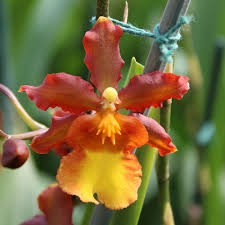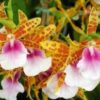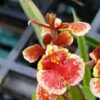# Exploring Notable Researchers in the Field of Orchidology

Orchids are among the most diverse and widespread families of flowering plants, captivating the hearts of botanists, horticulturists, and nature lovers alike. With their intricate beauty and unique characteristics, orchids have been the focus of extensive research and cultivation efforts worldwide. This article aims to delve into the contributions of some of the most prominent researchers in the field of orchidology, exploring their discoveries, innovations, and the lasting impact they have made on our understanding of these fascinating plants.
## 1. Introduction to Orchidology
Orchidology is the branch of botany that focuses on the study of orchids, encompassing their classification, biology, ecology, and cultivation. This field has attracted numerous researchers, each contributing to the body of knowledge surrounding these complex plants. From species discovery to conservation efforts, the work of these scientists has paved the way for advancements in horticulture, ecology, and even medicine.
### 1.1 The Importance of Orchid Research
The study of orchids is crucial for various reasons:
– **Biodiversity Conservation**: Orchids are vital components of many ecosystems and serve as indicators of environmental health.
– **Economic Value**: The global orchid industry, including cut flowers and ornamental plants, is worth billions of dollars, making research in cultivation techniques and disease management essential for sustainability.
– **Cultural Significance**: In many cultures, orchids hold symbolic meanings and are used in traditional medicine, art, and rituals.
## 2. Notable Researchers in Orchidology
### 2.1 George Ulysses T’ang
George Ulysses T’ang is a renowned figure in the field of orchid research, known for his contributions to orchid taxonomy and conservation. His work primarily focuses on the diverse orchid species found in Southeast Asia, particularly in regions such as Malaysia and Indonesia.
#### Key Contributions:
– **Taxonomic Studies**: T’ang has published numerous papers on the classification and naming of new orchid species, helping to clarify relationships within the Orchidaceae family.
– **Conservation Efforts**: He has been actively involved in conservation programs aimed at protecting threatened orchid species in their natural habitats. His research emphasizes the importance of sustainable practices in orchid cultivation to prevent habitat destruction.
### 2.2 Dr. Peter C. K. Cheung
Dr. Peter C. K. Cheung is a distinguished orchidologist and researcher at the Hong Kong Orchid Society. His work has significantly advanced our understanding of orchid breeding and hybridization.
#### Key Contributions:
– **Hybridization Techniques**: Dr. Cheung has developed innovative techniques for creating new orchid hybrids, focusing on improving flower traits such as color, size, and fragrance. His research has contributed to the popularity of hybrid orchids in the ornamental plant market.
– **Publications and Education**: He has authored several books and articles on orchid care and cultivation, making his findings accessible to both amateur gardeners and professional growers.
### 2.3 Dr. W. J. H. “Bill” Wylie
Dr. Wylie is an influential figure in the world of orchid conservation and ecology. His research primarily revolves around the ecological requirements of orchids and their interactions with pollinators.
#### Key Contributions:
– **Pollination Ecology**: Dr. Wylie’s studies on orchid-pollinator relationships have shed light on the complex mechanisms that drive orchid reproduction. His findings emphasize the importance of preserving both orchid species and their pollinator partners.
– **Ecological Restoration**: He has been involved in several ecological restoration projects aimed at reintroducing native orchid species into their natural habitats, highlighting the importance of habitat conservation.
### 2.4 Dr. Karen A. McGhee
Dr. Karen A. McGhee is a prominent researcher in the field of molecular biology and genetics, with a specific focus on orchids. Her work has advanced our understanding of orchid evolution and genetic diversity.
#### Key Contributions:
– **Genetic Studies**: Dr. McGhee has conducted extensive research on the genetic makeup of various orchid species, using molecular techniques to analyze their evolutionary relationships. Her work has provided insights into the mechanisms of speciation within the Orchidaceae family.
– **Conservation Genetics**: Her research emphasizes the importance of genetic diversity for the long-term survival of orchid populations, contributing to conservation strategies aimed at maintaining healthy genetic pools.
### 2.5 Dr. Robert J. K. Spalding
Dr. Robert J. K. Spalding is a well-known figure in orchid horticulture and breeding. His extensive knowledge of orchid cultivation has made significant impacts on both amateur and commercial growers.
#### Key Contributions:
– **Cultivation Techniques**: Dr. Spalding has developed practical cultivation methods that optimize growth conditions for various orchid species. His work has helped growers achieve better flowering and overall plant health.
– **Breeding Programs**: He has been involved in several breeding programs aimed at creating new orchid varieties that are more resilient to diseases and environmental stressors.
### 2.6 Dr. Monica L. Angelelli
Dr. Monica L. Angelelli is a leading researcher in the field of plant pathology, focusing on diseases that affect orchids. Her work has been instrumental in developing effective management strategies for common orchid pests and diseases.
#### Key Contributions:
– **Disease Management**: Dr. Angelelli’s research has led to the identification of key pathogens affecting orchids and the development of integrated pest management strategies. Her findings have significantly reduced the economic losses associated with orchid cultivation.
– **Education and Outreach**: She actively participates in workshops and training programs aimed at educating growers about best practices for disease prevention and management.
### 2.7 Dr. Stephen K. Wright
Dr. Stephen K. Wright is a botanist and orchid enthusiast known for his contributions to the study of rare and endangered orchid species. His research focuses on conservation strategies for preserving these vulnerable plants.
#### Key Contributions:
– **Field Surveys**: Dr. Wright has conducted extensive field surveys to document the distribution and population dynamics of endangered orchid species. His research helps inform conservation efforts and habitat restoration initiatives.
– **Collaboration with Conservation Organizations**: He collaborates with various conservation organizations to develop and implement strategies for protecting orchid habitats and promoting public awareness about the importance of orchid conservation.
## 3. The Impact of Research on Orchid Cultivation
The contributions of these notable researchers have not only expanded our understanding of orchids but have also had a significant impact on orchid cultivation practices.
### 3.1 Advancements in Breeding Techniques
Research in orchid hybridization and genetics has led to the development of new orchid varieties that exhibit desirable traits such as disease resistance, improved flowering, and unique colors. This has resulted in a flourishing orchid market, where growers can offer a diverse range of options to consumers.
### 3.2 Enhanced Conservation Efforts
The insights gained from studies on orchid ecology and conservation genetics have informed conservation strategies, leading to more effective programs aimed at protecting threatened orchid species and their habitats. This has fostered a greater awareness of the importance of biodiversity and ecosystem health.
### 3.3 Education and Outreach
Many researchers in the field of orchidology are dedicated to education and outreach efforts, sharing their knowledge with the public through workshops, publications, and online resources. This has helped cultivate a new generation of orchid enthusiasts and informed growers about best practices in cultivation and conservation.
## 4. Conclusion
The field of orchidology continues to thrive, driven by the passion and dedication of researchers committed to advancing our understanding of these extraordinary plants. The contributions of notable figures such as George Ulysses T’ang, Dr. Peter C. K. Cheung, and others have played a vital role in shaping the future of orchid research and cultivation.
As we continue to explore the intricacies of orchids, it is essential to support and celebrate the work of these researchers, whose discoveries not only enrich our knowledge but also contribute to the conservation and sustainable management of these captivating plants. Through ongoing research, education, and collaboration, the legacy of orchidology will continue to flourish for generations to come.

